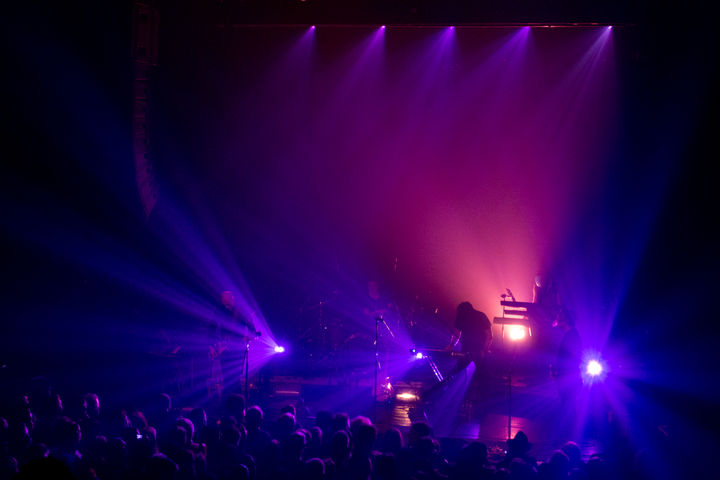Gary Numan at The Gramercy Theatre
New York, NY, USA
"I don't know," M. said. "Three nights sounds like a lot of Gary Numan."
"It does," I admitted. "But I'm tempted anyway."
My own pop-musical awakening came around the time that Gary Numan had his first hits. Synthpop, with its post-punk influences, spacey sounds and science-fiction aesthetics, meshed perfectly with my own mental landscape of the time. Bands like Orchestral Manoeuvres in the Dark, Visage, Ultravox, John Foxx and Numan's Tubeway Army were in heavy rotation during a good part of my adolescence. It was music for nerds by nerds, and as a self-acknowledged nerd I didn't feel bad about liking it.
Over the years, my musical tastes broadened. Many of the bands that I listened to as a teenager faded into semi-obscurity. Some disappeared entirely, while others revived or reinvented themselves. In the latter group was Gary Numan, whose collaboration with Trent Reznor of Nine-Inch Nails injected a heavier, more muscular sound into his music. The darkness had been there all along – "Replicas", with its vision of a nightmarish future full of mach-men and rape machines and interchangeable electric 'friends', was nothing if not dark. But the grinding industrial beats of NiN turned out to be the missing ingredient that Numan's music needed, turning the nerdy pop of the 80's with its rather thin sound into something more contemporary, harder-hitting, more ominous: pop transformed into rock.
My first re-exposure to the new flavor was at a 2010 show in a large venue, where our seats were so far back that the performers were hardly visible, tiny figures on a distant stage. Still, it was enough to make me want to see more, and his 2013 show at the Music Hall of Williamsburg was much better, the venue small enough that you could get right up to the stage and lose yourself in the performance. And it was on the strength of that show that we decided to go ahead and buy tickets for all three nights of his New York residence, to hear him re-create his first three albums – "Replicas", "The Pleasure Principle", and "Telekon" – live on stage.
I hadn't been to the Gramercy before, but it turned out to be a pretty good venue. The sound is decent, and if you show up early enough you can sit or stand as you please. For the first couple of nights, we took advantage of the banked seating at the back to sit back and watch the lightshow in comfort. By the third, I was ready for something different, so I made my way down to the front, and staked out some standing room right in front of the stage.
Quite aside from the advantages of proximity, being down front was just more … colorful. As we waited for the main act, a long-haired gentleman beside me was showing off Uri Geller-style fork-bending to his new acquaintances: "These are just ordinary forks from Costco … but now watch!" He explained that his particular schtick was magic involving technology: "… iPads, smartphones, that kind of thing." Immediately in front of me was a man in a crisp jacket and a fedora, one hand gripped by a nightmarish steampunk prosthetic that he waved at the stage. On my right, the blue-haired guitarist from Slang King leaned on the barrier, perfectly in tune with the prevailing aesthetic.
The shows themselves were everything we could have hoped for. The music, revitalized with a shot of industrial rock, has stood the test of time fairly well. The band were more than competent – when they weren't, Numan, ever the perfectionist, stopped mid-song and took it from the top again. The hits – "Cars", "Are Friends Electric?", "Down in the Park" and "Me I Disconnect From You" – have become big, crowd-pleasing anthems that are just fun to hear and watch. Three nights was indeed a lot of Gary Numan, but in the end we didn't regret it.
Numan and his fans – the Numanoids – have always been easy targets for mockery. Even the borrowed cool of Trent Reznor can't dispel the lingering flavor of nerdiness that clings to the man and the music. But there's more to it than that. His performances are confident and kinetic; between numbers, he can break character to become engagingly self-effacing and human: "Well, that was a bit crap," he admitted cheerfully on the first night. "Totally my fault."
I came away with the impression that it wasn't just his style that has evolved. The eerie, autistically-diffident persona of his early work – a boy playing a robot playing a man – has given way to an artist who wants to engage with his audience, who wants to give them something that is important to them. And what comes across is his sincerity, his obvious pleasure at delivering something that matters to his fans. When he sings, "… but you see this means everything to me," they know exactly what he means.
